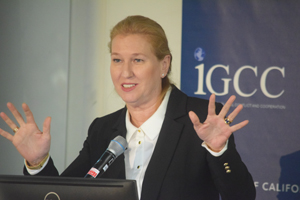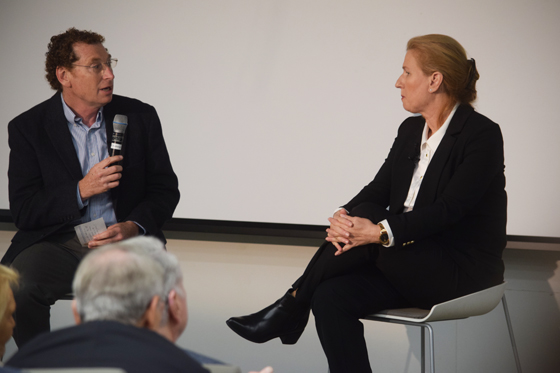

LA JOLLA, California – A reflective Tzipi Livni, former foreign minister of Israel, said Monday that President Trump’s decision to abandon the Kurds of Syria to Turkey’s aggression has strengthened hard-liners in Israel, who argue that it proved Israelis can’t trust anyone but themselves if a new Palestinian state launched attacks on Israel.
On the UC San Diego campus, Livni gave the annual Herb York Memorial Lecture, which is named for the university’s first chancellor who helped build America’s atom bomb during World War II and later in his life became a peace advocate. A full-house at the Robinson Auditorium included York’s widow Sybil, daughter Rachel, and other members of his family.

When it comes to hardliners, Livni knows of what she speaks. When she heard of York’s political metamorphosis, she said she could relate well to his story. Sharing family anecdotes along with her experiences in a variety of Israel’s top offices, Livni said she grew up the daughter of two members of the militant, pre-Israel independence, Irgun, who met while robbing a British money train in Mandatory Palestine in order to pay for arms for independence fighters. Her parents, Eitan and Sara, later were imprisoned by the British, and both broke out of separate jails, Livni said. They married on the day David Ben-Gurion declared Israel’s independence.
Their tombstone has upon it a map of a Greater Israel, covering both sides of the Jordan River. When Livni became an advocate for a two-state solution on the west side of the Jordan River with Israelis and Palestinians living side-by-side, her mother called her up to express her disappointment. But she eventually relented, urging Livni to do what was best for her children , who, of course, were her mother’s grandchildren.
The former foreign minister said that it was during the Second Lebanon War that she realized that there could be no military solution to Israel’s troubles with its neighbors, only a political one. She said when the terrorist group Hezbollah attacked settlements in the north of Israel, she was urged by then U.S. Secretary of State Condeleezza Rice to prevent her country’s military forces from destroying the duly constituted Lebanese government while retaliating against Hezbollah.
The situation was complex: America, Israel’s greatest ally, wanted Israel to preserve the Lebanese government, but the Lebanese government was infiltrated by Hezbollah, which operated an independent militia in the south of Lebanon.
Although Lebanese and the Palestinians are different adversaries, Livni said the complexity and asymmetry of the situation persuaded her that somehow Israel must find a way to forge political agreements with Arab enemies.
The foreign minister acknowledged that Hamas which controls Gaza is dead set against any peace agreement with Israel, whereas President Mahmoud Abbas of the Palestinian Authority on the West Bank is politically too weak to agree to an accord.
Nevertheless, she said, she is optimistic. She likened Israel’s situation to a driver being stuck in a traffic jam. For the moment, the driver is stuck, but traffic may clear up, or perhaps there will be an alternative route.
Besides encouraging hardliners in their distrust of Arab intentions, the United States abandonment of the Kurds has emboldened Iran in its efforts to create a crescent of opposition north of Israel, stretching from Iran to Iraq to Syria to Lebanon, Livni said.
She said Israel remained neutral in the Syrian civil war, realizing that the regime of President Bashar al-Assad and ISIS were both inimical to Israel’s interests. However, she said, Israel continues to have a legitimate interest in preventing Iran from establishing military bases in Syria because it doesn’t want a powerful enemy right on its border.
The one-time Foreign Minister and former leader of the Opposition said her advice for the Israeli government—whoever it eventually may be led by — is not to give up on negotiations with the Palestinians; to convince the Gulf States that they should work together with Israel in common cause against Iran, and to explain to the United States that its continued involvement in the Middle East is crucial.
She said the basis of U.S. -Israel cooperation is that, in the first place, Israel will never ask for American soldiers to fight in Israel in order to protect it. On the other hand, she said, whenever enemies look at Israel, they also see looming behind it the powerful United States as a guarantor.

Under auspices of UC San Diego’s School of Global Policy and Strategy, Livni was introduced by economics professor Eli Berman, who later moderated a question-and-answer session. Questions were submitted in writing by members of the audience who filled every seat in the auditorium.
In response to one question, Livni said she personally hopes that Benny Gantz will lead Israel’s next government – not surprising as she was long in opposition to the current Prime Minister Benyamin Netanyahu. However, she said she was concerned that any government that Gantz may form– whether in alliance with Netanyahu’s Likud, or fashioned from a coalition of minority parties – might be too unstable to make important decisions, such as coming to an agreement with the Palestinians.
However, she said she was pleased that the last election indicated that the power of Israel’s right-wing parties is being diminished.
She declined to answer a question whether Gantz could be able to govern if he fashioned a majority coalition with anti-Zionist Arab parties.
Asked by a questioner about the growing rift between some American Jews and Israel, she quipped that being a liberal in the United States today seems to mean being a vegan and joining the BDS (Boycott, Divestment and Sanctions) movement against Israel.
She said that she hopes American Jews and Israelis can come to agreement on three major points:
–That Israel is a Jewish state, with equal rights for its minorities.
–That Israel should be a democracy
–That Israel has the right to defend itself.
Beyond that, she added, a debate on Israeli policy would be welcome. As a former member of the opposition, she said, she certainly believes the policies of Israel’s government can be disagreed with.
Livni repeated a story that former Israeli Prime Minister Ariel Sharon used to tell about his boyhood working in the fields with his father on terribly hot days. After a while, Sharon would complain about how hot it was, and how much more work they had to do.
Sharon’s father would direct him to turn around and look back to see how much work they already had done.
She said Israel has many problems in front of it, but it too has come a long way from the time it was a brand new, struggling country.
*
Donald H. Harrison is editor of San Diego Jewish World. He may be contacted via donald.harrison@sdjewishworld.com
Don,
Article captures the event nicely, and includes a photo of Sybil York !
– eli